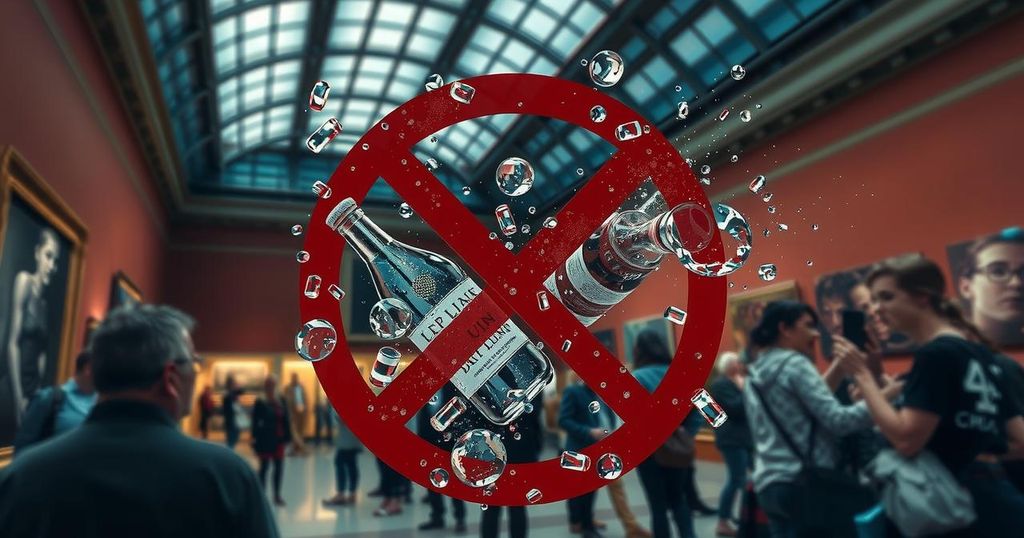National Gallery in London Enforces Ban on Liquids Amidst Climate Activism Attacks
The National Gallery in London has instituted a ban on liquids following multiple climate activist attacks on artworks. This decision aims to protect its invaluable collection and ensure safety for visitors. While protests have drawn attention to pressing issues such as climate change and political conflicts, the museum’s security measures reflect the challenges faced by cultural institutions in maintaining their integrity amidst societal activism.
In response to a troubling pattern of climate activism that has resulted in attacks on renowned artworks, London’s National Gallery has instituted a ban on liquids within its premises, as well as several additional security measures. This decision comes amidst growing concerns over the preservation of invaluable pieces of art, which the museum describes as irreplaceable. An official statement highlighted that, “The collection we hold is irreplaceable and with each attack we have been forced to consider putting more barriers between the people and their artworks to preserve these fragile objects for future generations.” The museum emphasizes that this step was necessary for maintaining the safety of visitors and staff. The restriction extends beyond mere water bottles, as visitors are now prohibited from bringing any liquids into the gallery, although complimentary tap water will still be available on-site. In recent years, a wave of protests by activists—including notable incidents where soup was thrown at pieces such as Van Gogh’s “Sunflowers” and paint was sprayed on landmarks—has escalated. Initially focused on climate issues, these demonstrations have broadened to include political messages related to the ongoing conflict in Gaza. Although most artworks remain unharmed due to protective measures, there have been instances where actual damage occurred, notably during a protest involving Van Gogh’s painting, which resulted in damages exceeding £10,000. The National Museum Directors’ Council has publicly called for an end to such disruptive actions, stating: “Whilst we respect the right for people to protest, and are often sympathetic to the cause, these attacks have to stop. They are hugely damaging to the reputation of UK museums…” The Council implores that museums should provide a sanctuary of solace, separate from such demonstrations. In an ironic twist, Just Stop Oil responded to the growing critiques with their own letter, arguing that their disruptive actions are necessary to draw attention to the severe consequences of climate inaction. They assert, “These actions cause small amounts of damage and disruption to bring to attention the enormous damage and destruction that our government is supporting.” Their demand for a meeting with museum officials reflects an ongoing tension between activists’ messaging and the institutions’ operational integrity.
The recent spate of climate activism has led to significant tensions between protesters and cultural institutions, as activists resort to defacing art to highlight urgent societal issues. This tension has arisen in a context of global environmental crises and political conflicts, necessitating both the preservation of cultural heritage and the expression of dissent. With notable incidents occurring globally, including soup splashed on famous artwork and painting defacement, museums have found themselves reassessing security protocols. The National Gallery’s decision to ban liquids is a direct response to increasing incidents of vandalism allegedly aimed at raising awareness and prompting discourse on climate issues and political actions.
The National Gallery’s recent liquid ban underscores the ongoing conflict between activism and cultural preservation. As climate protests increasingly intersect with art, museums are compelled to adapt to protect their collections while still engaging with the critical issues at hand. The call from the National Museum Directors’ Council reflects a broader consensus on the need for safe, peaceful spaces for both art and discourse. Moving forward, the balance between activism and the sanctity of art will remain a contentious topic in public and cultural discourse.
Original Source: www.washingtonpost.com




Post Comment